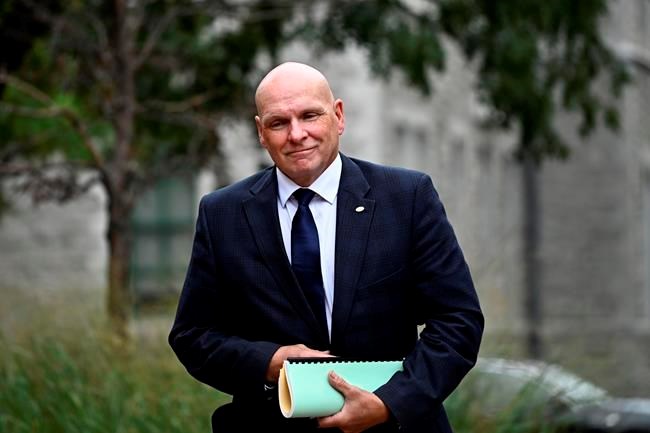OTTAWA — Notes taken during a meeting between city employees and "Freedom Convoy" protesters show the City of Ottawa entertained allowing big-rig trucks to remain on the street along Parliament Hill indefinitely, the court heard Thursday.
The notes were produced by the defence during the criminal trial of two convoy organizers, Tamara Lich and Chris Barber. They had struck a deal with then-mayor Jim Watson to move trucks out of residential neighbourhoods and onto Wellington Street during the protest last year.
The city's emergency services manager, Kim Ayotte, met with several convoy organizers and other city staff over pizza on Feb. 13 to go over the details and come up with a plan.
Barber was among the protest organizers in attendance.
"Kim Ayotte produced maps and outlined the area on Wellington that the city is agreeable to stage trucks indefinitely," said minutes of that meeting, which were filed as evidence in court.
Ayotte told the court Thursday that police never agreed to stage the trucks indefinitely, and that was not part of the deal.
"Police were in the room and they did not agree to that," Ayotte said on the witness stand.
Ayotte took notes throughout the protest, but didn't make any during the meeting. He said he understood the meeting to be an informal attempt to build relationships with the protest organizers.
The agreement was brokered between Watson and Lich by Dean French, the former chief to staff to Premier Doug Ford, Serge Arpin told the court Thursday. Arpin served as Watson's chief of staff at the time.
The mayor offered to meet with protesters and hear out their concerns if they could show significant progress on moving the trucks.
Ayotte said he considered the agreement they struck a success on Feb. 14, when Barber reported to Ayotte that he had worn himself out moving 40 trucks.
Those efforts stopped on Feb. 15 after an incident between police and protesters.
"We had little troubles this morning in communication with some city police," Barber wrote to Ayotte in a text message sent Feb. 15. The message was filed as evidence in the trial.
"Kinda put things on hold till issues are resolved."
Ayotte reached out to his point person with the police, acting Supt. Robert Drummond, but said the police gave him limited information about why the deal fell through.
A text message exchange filed as evidence to the court shows Drummond initially told Ayotte that the police liaison team would check in with the truckers on Feb. 15 "to see if there are any more takers, but the groups are very fractured."
Later that morning, Drummond said police would not be helping to move any more trucks, except for those of protesters who wanted to voluntarily leave the city.
Arpin said the city was aware that there were various factions in the convoy, but French had told him that Lich and Barber were part of the "broad, moderate leadership."
That day of the meeting with convoy organizers over pizza, Ayotte signed an affidavit in support of the city's request to the Ontario Superior Court for an injunction against people who violated city bylaws.
Lawrence Greenspon, the lawyer representing Lich, said Ayotte's affidavit did not mention the agreement by convoy organizers to reduce the footprint of the protest zone that had been struck earlier the day.
In response to questioning by Greenspon, Ayotte also confirmed that no one with the City of Ottawa mentioned the coming injunction application to protest organizers who attended the pizza meeting.
Barber's lawyer, Diane Magas, said the tone of the affidavit suggested that demonstrators were not co-operating with the city or police at all.
"But that's not quite true," Magas said, pointing to the co-operative effort to move trucks that they agreed to in a meeting with him hours before he signed the document.
Justice Heather Perkins-McVey asked if Ayotte revised his affidavit at all in light of the plan he made with protest organizers. He said he did not, and he viewed them as "two separate issues.
Arpin's testimony is expected to continue Friday.
This report by The Canadian Press was first published Sept. 21, 2023.
Laura Osman, The Canadian Press



